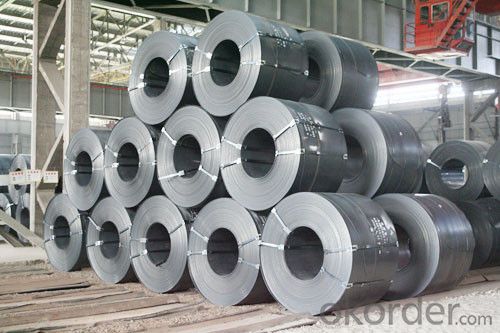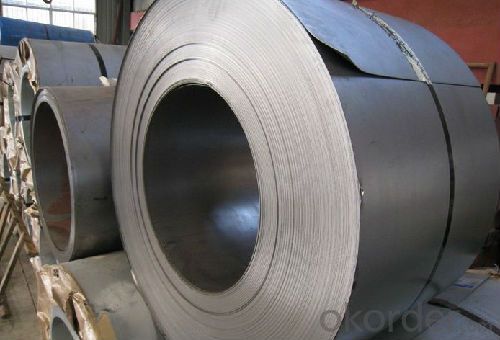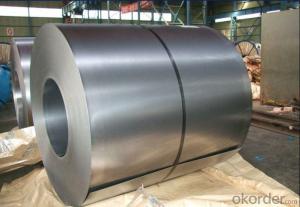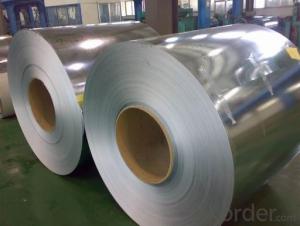Grade Q450NQR1 Corten Steel Coil 2.5*1250*C
- Loading Port:
- Shanghai
- Payment Terms:
- TT or LC
- Min Order Qty:
- 100 m.t
- Supply Capability:
- 20000 m.t/month
OKorder Service Pledge
OKorder Financial Service
You Might Also Like
Grade Q450NQR1 Corten Steel Coil 2.5*1250*C
Description:
-Grade: 09CuPCrNi-A
-Specification: 2.5*1250 in coil
Chemical Composition(%) of Grade Q450NQR1 Corten Steel Coil 2.5*1250*C:
| C | Si | Mn | P | S | Cu | Ti/V | Cr | Ni | RE |
| ≤0.12 | 0.25~0.75 | 0.20~0.50 | 0.060~0.12 | ≤0.020 | 0.25~0.50 | / | 0.30~1.25 | 0.12~0.65 | / |
Mechanical Properties of Grade Q450NQR1 Corten Steel Coil 2.5*1250*C:
| Thickness(mm) | Y.S(MPa) | T.S(MPa) | EL. A5% | Bend 180o | Impact Test | |
| oC | AKV J | |||||
| 2.0~≤6.0 | ≥345 | ≥480 | ≥24 | d=a | Normal/-40 | ≥47/≥21 |
| >6.0~12.0 | d=2a | |||||
Application of Grade Q450NQR1 Corten Steel Coil 2.5*1250*C:
Used in different weather. It has good anti rust protection and welding ability and is used in shipping container,support frame of outside building etc. Remarkably enhances the anti-corrosive performance of the structural element, lengthens the structural element service life, uses in manufacturing each kind of structural element which was used under the atmospheric envirenment and the caustic gas, the liquid envirenment.
Payment:
-Invoicing on theoretical weight or actual weight as customer’s request.
-FOB, CFR or CIF.
-Regular terms of payment:
1, 30% payment in advance, the remaining balance (70% payment) against the copy of B/L.
2, 30% payment in advance, the remaining balance (70% L/C) against the copy of B/L.
3, Negotiable.
-The payment terms will be written in contraction detailedly.
FAQ:
Q1: Why buy Materials & Equipment from OKorder.com?
A1: All products offered byOKorder.com are carefully selected from China's most reliable manufacturing enterprises. Through its ISO certifications, OKorder.com adheres to the highest standards and a commitment to supply chain safety and customer satisfaction.
Q2: How do we guarantee the quality of our products?
A2: We have established an advanced quality management system which conducts strict quality tests at every step, from raw materials to the final product. At the same time, we provide extensive follow-up service assurances as required.
Q3: How soon can we receive the product after purchase?
A3: Within three days of placing an order, we will arrange production. The shipping date is dependent upon the quatity, how many sizes you want and the plan of production, but is typically 1 month to 2 month days from the beginning of production.
Images of Grade Q450NQR1 Corten Steel Coil 2.5*1250*C:


*If you would like to get our price, please inform us the size, standard/material and quantity. Thank you very much for your attention.
- Q:How is case-hardening steel used in the production of gears and camshafts?
- Case-hardening steel is used in the production of gears and camshafts to enhance their surface hardness and durability. The process involves heating the steel to a specific temperature and then rapidly cooling it, creating a hard outer layer while maintaining a tough and ductile core. This hardened surface allows gears and camshafts to withstand the high levels of stress, friction, and wear they experience during operation, resulting in improved performance, longevity, and reliability.
- Q:Is special steel suitable for structural applications?
- Yes, special steel is suitable for structural applications. Its unique properties such as high strength, durability, and resistance to corrosion make it an ideal choice for constructing buildings, bridges, and other infrastructure where structural integrity is crucial. Special steel also offers excellent weldability and formability, allowing for versatile design possibilities in structural applications.
- Q:What are the different methods of surface etching for special steel?
- There are several different methods of surface etching that can be used for special steel. These methods include: 1. Chemical etching: Chemical etching involves the use of various acids or other chemical solutions to selectively remove material from the surface of the steel. This method allows for precise control over the etching process and can create highly detailed patterns or designs on the steel surface. 2. Electrochemical etching: Electrochemical etching uses an electrical current to etch the surface of the steel. This method can be particularly effective for creating deep, uniform etches and is often used for marking or labeling purposes. 3. Laser etching: Laser etching involves the use of a high-powered laser to remove material from the steel surface. This method is highly precise and can create very intricate designs or markings. Laser etching is commonly used for branding or decorative purposes. 4. Mechanical etching: Mechanical etching utilizes physical abrasion to remove material from the steel surface. This can be done manually using tools such as sandpaper or brushes, or with the help of machinery like a sandblaster. Mechanical etching is often used to create a textured or roughened surface. 5. Plasma etching: Plasma etching involves the use of a high-energy plasma to remove material from the steel surface. This method is particularly useful for creating very fine, shallow etches and is commonly used in microfabrication or semiconductor manufacturing. Each of these methods has its own advantages and limitations, and the choice of which method to use will depend on factors such as the desired outcome, the type of special steel being etched, and the available equipment and resources.
- Q:How does special steel perform in high-speed applications?
- Special steel is specifically designed to perform exceptionally well in high-speed applications. Its unique composition and manufacturing process make it highly resistant to heat, wear, and fatigue, allowing it to withstand the extreme conditions often encountered in high-speed operations. One of the key properties of special steel that makes it ideal for high-speed applications is its high strength-to-weight ratio. This means that it can maintain its structural integrity and withstand heavy loads while being lightweight, enabling it to efficiently handle the demands of high-speed operations. Additionally, special steel possesses excellent heat resistance, which is crucial in high-speed applications where temperatures can rise significantly. It has a high melting point and can maintain its strength and hardness even at elevated temperatures, preventing deformations or failures that could occur with other materials. Furthermore, special steel's exceptional wear resistance ensures long-lasting performance in high-speed applications. It is able to withstand the continuous friction and abrasive forces that occur at high speeds, reducing the need for frequent replacements and improving overall efficiency. Moreover, special steel's resistance to fatigue is another important factor in its performance in high-speed applications. It can withstand repetitive loading and cyclic stresses without developing cracks or fractures, ensuring a longer service life and minimizing the risk of sudden failures. In summary, special steel is specifically engineered to excel in high-speed applications. Its high strength-to-weight ratio, heat resistance, wear resistance, and fatigue resistance make it an ideal choice for industries such as aerospace, automotive, and manufacturing, where high-speed operations are common. Its superior performance in these applications ensures reliable and efficient performance, contributing to enhanced productivity and safety.
- Q:How does special steel perform in terms of high-temperature strength?
- Special steel typically performs very well in terms of high-temperature strength. It has excellent resistance to thermal fatigue, oxidation, and creep, allowing it to withstand extreme heat conditions without losing its structural integrity or mechanical properties. This makes special steel a preferred choice in applications where high-temperature strength is crucial, such as in the aerospace, power generation, and petrochemical industries.
- Q:How does special steel perform in high-temperature mechanical applications?
- Special steel performs exceptionally well in high-temperature mechanical applications. Thanks to its unique composition and properties, such as high strength, excellent heat resistance, and thermal stability, special steel can withstand extreme temperatures without losing its structural integrity or mechanical properties. It exhibits minimal creep, oxidation, and deformation, ensuring reliable performance and durability in demanding high-temperature environments.
- Q:How does special steel contribute to sustainable development?
- Special steel contributes to sustainable development in several ways. Firstly, it is a highly durable and long-lasting material, which means that products made from special steel have a longer lifespan, reducing the need for frequent replacements and reducing waste. Additionally, special steel is often used in the construction of energy-efficient buildings and infrastructure, contributing to the reduction of energy consumption and greenhouse gas emissions. Furthermore, special steel is recyclable, allowing for the recovery and reuse of materials, reducing the demand for virgin resources and minimizing the environmental impact of steel production. Overall, the use of special steel promotes resource efficiency, environmental conservation, and economic growth, making it an important component of sustainable development.
- Q:What are the different mechanical properties of special steel?
- Special steels have a variety of mechanical properties that make them unique and suitable for specific applications. Some of the key mechanical properties of special steel include high strength, excellent toughness, good wear resistance, and superior corrosion resistance. High strength is one of the most important properties of special steel. It allows the material to withstand heavy loads and stress without deformation or failure. This property makes special steel suitable for applications where structural integrity and durability are critical, such as in the construction of buildings, bridges, and machinery. Another significant mechanical property of special steel is its toughness. Toughness refers to the ability of a material to absorb energy and resist fracture under impact or sudden loads. Special steels with high toughness are essential for applications that involve dynamic and high-impact forces, such as in the manufacturing of tools, gears, and machinery components. Wear resistance is another important mechanical property of special steel. It refers to the ability of a material to resist damage and deterioration due to friction, abrasion, or erosion. Special steel with good wear resistance is commonly used in applications where it will be subjected to harsh conditions or repetitive mechanical actions, such as in the production of cutting tools, dies, and molds. Superior corrosion resistance is a valuable mechanical property of special steel, especially in environments where exposure to moisture, chemicals, or extreme temperatures is likely. Special steels with high corrosion resistance can withstand the deteriorating effects of oxidation, rust, and chemical reactions, making them suitable for applications in industries such as marine, chemical, and oil and gas. In summary, special steels possess a range of mechanical properties that set them apart from conventional steels. High strength, excellent toughness, good wear resistance, and superior corrosion resistance are some of the key mechanical properties that make special steel a preferred choice for various industrial applications.
- Q:How does special steel maintain its strength at different temperatures?
- Special steel maintains its strength at different temperatures due to its unique composition and heat treatment process. It is alloyed with elements like chromium, nickel, and molybdenum, which form stable compounds at high temperatures, preventing the steel from losing its strength. The heat treatment process involves carefully controlling the cooling rate, which further enhances the steel's microstructure and ensures its strength is retained even at extreme temperatures.
- Q:What are the different defense grades of special steel?
- The different defense grades of special steel typically include grades such as AR200, AR400, AR500, and AR600, which are commonly used for protective armor and structural applications. These grades have varying levels of hardness, strength, and resistance to abrasion, making them suitable for different levels of defense against impacts, wear, and penetration.
1. Manufacturer Overview |
|
|---|---|
| Location | |
| Year Established | |
| Annual Output Value | |
| Main Markets | |
| Company Certifications | |
2. Manufacturer Certificates |
|
|---|---|
| a) Certification Name | |
| Range | |
| Reference | |
| Validity Period | |
3. Manufacturer Capability |
|
|---|---|
| a)Trade Capacity | |
| Nearest Port | |
| Export Percentage | |
| No.of Employees in Trade Department | |
| Language Spoken: | |
| b)Factory Information | |
| Factory Size: | |
| No. of Production Lines | |
| Contract Manufacturing | |
| Product Price Range | |
Send your message to us
Grade Q450NQR1 Corten Steel Coil 2.5*1250*C
- Loading Port:
- Shanghai
- Payment Terms:
- TT or LC
- Min Order Qty:
- 100 m.t
- Supply Capability:
- 20000 m.t/month
OKorder Service Pledge
OKorder Financial Service
Similar products
New products
Hot products
Related keywords






























